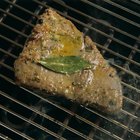
As tough as alligators are in the wild, it comes as no surprise they're just as tough in the kitchen. Several cuts of alligator meat correspond with beef, like the tenderloin. Unlike beef, though, which you can generally categorize as tender or tough, alligator meat has two levels of tenderness: tough and tougher. Alligators eat what they want, when they want, so they have minimal fat reserves, and their meat is lean. The cut determines the cooking method. You can cook tough alligator steaks, such as fillets, in a pan, but tougher cuts, such as sirloin, flank and tail, need to be braised.
Tough
Step 1
Marinate the alligator steak for 2 to 3 hours. You can build a marinade around oil and acid or cultured buttermilk. Buttermilk is a better tenderizer than acid, but you have more flavoring options with oil. Oil extracts the essential oils from fresh herbs and peppers, while buttermilk doesn't. You can also use a wide array of acids, such as Worcestershire sauce, lemon juice or any vinegar, with an oil-based marinade.
Step 2
Wipe off the excess marinade and let the alligator steaks sit at room temperature for about 30 minutes. Season the alligator with kosher salt if you didn't use salt or salty ingredients in the marinade.
Step 3
Heat a few tablespoons of oil or a combination of oil and butter in a heavy-bottomed pan or skillet over medium-high heat. Lay the alligator steaks in the pan, giving each steak at least 1/2 inch of space.
Step 4
Sear the alligator on both sides until golden brown, just like a regular steak. It takes about 3 to 4 minutes of cooking on each side to sear alligator meat and develop a golden-brown crust.
Step 5
Lower the heat to medium if the alligator steak measures 1/2 inch thick or less, and lower the heat to medium-low and cover the pan with a lid if it measures 1/2 inch thick or more.
Step 6
Turn the steak over every 4 or 5 minutes so it cooks evenly on both sides.
Step 7
Cook the alligator for about 15 to 20 minutes after you sear it if you're cooking a thin steak, and 25 to 30 minutes after you sear it if you're cooking a thick steak.
Step 8
Check the internal temperature of the steak with a meat thermometer after you take it out of the pan, and make sure it measures at least 165 degrees Fahrenheit.
Step 9
Cover the alligator steaks loosely with aluminum foil and let them rest for at least 10 minutes before you serve them. Cut the steaks across the grain to make them easier to chew.
Tougher
Step 1
Marinate the steaks in a buttermilk-based marinade for 2 to 3 hours. Wipe the buttermilk from the steaks and let them sit at room temperature for about 30 minutes.
Step 2
Heat the oven to 300 degrees Fahrenheit. Heat a few tablespoons of oil or oil and butter in a Dutch oven or an oven-safe skillet or pan.
Step 3
Season the steaks to taste and sear them on both sides until golden-brown. Add aromatics, such as onions and garlic, to the pan and cook until fragrant, about 5 minutes.
Step 4
Turn the heat off and pour enough stock in the pan to almost cover the steaks. Add spices and herbs to stock, if desired.
Step 5
Cover the Dutch oven or pan. If using a pan or skillet, cover it with a piece of foil a few inches larger and place the lid or a lid close to its size on top of the foil. Unlike Dutch ovens, most skillet and pans don't have lids or have lids that don't fit tight enough to seal well; foil helps keep moist heat in the pan.
Step 6
Braise the alligator steaks in the oven for 1 hour and turn them over. Add stock as needed to keep the steaks at least halfway submerged at all times.
Step 7
Braise the steaks for another 30 minutes and check their tenderness with a fork. Remove the pan when the steaks reach the desired tenderness.
Step 8
Transfer the alligator steaks to a plate and cover them loosely with aluminum foil. Let the steaks rest for about 10 minutes.
Step 9
Make a sauce using the stock and drippings in the pan while the steaks rest, if desired. Bring the liquid to a boil and thicken it with roux or a cornstarch slurry and simmer for about 10 minutes. Taste the sauce and adjust the seasoning as needed with kosher salt and freshly ground black pepper.
Related Articles

How to Cook Axis Deer Steaks

How to Cook Worcestershire Marinated ...

How to Cook Veal Sirloin

How to Cook Deer Sirloin
The Best Way to Cook Bison Steak

How to Marinate Ahi Tuna

How to Cook Beef Tenderloin on a ...

How to Cook Kobe Steaks

How to Cook Bone-In Pork Strips in the ...

How to Cook Yellowtail in the Oven

How to Cook Pan Fried Deer Tenderloin

How to Cook a Breaded Thick Cube Steak

How to Cook a Bone-in Leg of Lamb

How to Smoke Tuna

How to Cook Antelope

How to Grill T-Bone Steaks

Grilling a Top Sirloin Filet in a Cast ...

How to Sear Tenderloin Steak and Cook ...
How to Cook Shark on the Grill

Easy Ways to Cook Pork Steak
References
Tips
- You can also cook alligator steaks on the grill. Set up the grill to cook indirectly, and grill the steaks for about 30 minutes per inch of thickness, turning every few minutes. Check the steaks' internal temperature with a meat thermometer to make sure they reach 165 degrees before serving.
Writer Bio
A.J. Andrews' work has appeared in Food and Wine, Fricote and "BBC Good Food." He lives in Europe where he bakes with wild yeast, milks goats for cheese and prepares for the Court of Master Sommeliers level II exam. Andrews received formal training at Le Cordon Bleu.
Photo Credits
Comstock Images/Stockbyte/Getty Images